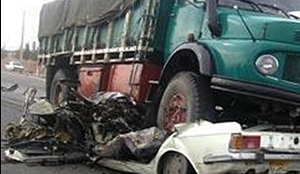 AS I write this article my heart goes to the families of the Mazabuka tragedy that claimed twelve lives in February.
AS I write this article my heart goes to the families of the Mazabuka tragedy that claimed twelve lives in February.
According to media reports, the driver of the truck swerved to the lane of an oncoming Marcopolo Bus in an effort to avoid a cyclist thereby colliding with the bus.
Many people of course will be interested to know who was to blame for the accident. Was it the cyclist or the truck driver?
I heard a number of people advancing opinions that the truck driver should not have avoided the cyclist since it was just one person.
It is not the intention of this column to delve into the debate of who was to blame but merely state that an accident occurred, lives were lost and for now we can only say hearty condolences to the families involved.
Today’s discussion focuses on the need to increase third party limits for commercial vehicles.
Currently, each vehicle should have minimum insurance which covers third parties up to K30,100 per person or K60,100 per event or aggregate.
Property damage is not mandatory but in practice insurers are providing about K30,000 per vehicle.
Who is a third party ?
First and foremost there are three parties in an insurance contract.
The first is the insured or policyholder while the second party is the insurer.
The third party refers to any person who suffers loss or damage as a result of the activities or the usage of the motor vehicle of the first party for example pedestrians, passengers, other property owners, etcetera.
With a third party insurance policy in place the responsibility for compensation is transferred to an insurance company subject to the policy limits stated in the insurance policy or on the certificate.
The limits stated above are the standard ones in Zambia compared to one million pounds in the United Kingdom for property damage and unlimited for injuries/death respectively.
Taking a real life example of the Post Bus that claimed about 53 lives last year in February it means that if that company had bought a standard third party insurance then the victims i.e. those who died or were injured should have shared the K60,100.
If we consider only those who died, then on each life less than K1 thousand five hundred could have been paid.
Now if we consider this amount how far can it go even just for preparing a funeral?
However in our case it was reported in the media that Zampost were paid K1 million by their insurer and the money was to be shared equally to the affected families.
This translates to a payout of about K19 thousand of the fifty three people who died before looking at those who were injured. Though it is difficult to place value on life this amount really seems little.
For this reason public service and commercial vehicle owners need to seriously think about increasing their limits so that they have adequate funds from insurance proceeds to compensate passengers who may get injured or die from road tragedies.
By the way third parties can still claim over and above what is covered by insurers but you can imagine how difficult it could be for these unbudgeted amounts to the vehicle owners.
Premiums are actually minimal for increased third party limits. As a general guide insurers will charge about 0.5 per cent on the increased limit.
Alternatively a combined single liability limit can be arranged. The difference with the above is that combined single liability will not restrict the type of damage but will compensate for either property damage or injuries/death whichever comes first but up to the limit stated in the policy.
With less people voluntarily increasing their third party limits the government may need to step in to revise these limits in the interest of the general public, just a thought.
(In the coming few weeks as we count down to end of 2014 I will revisit some articles published in the course of the year starting with the one we featured on February 26 2014).
Comments: webster@picz.co.zm or webster_tj@hotmail.com or on face book search for Insurance Talk-Zambia page or call/text 0977 857 055
(The author is a Chartered Insurer with ten years industry experience)







